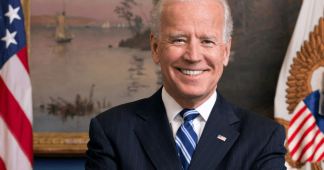Panagiota Gounari,
Professor, Department of Applied Linguistics, University of Massachusetts, Boston
interview with Giannis Elafros
November 16, 2011
“The contribution to Trump’s defeat by grassroots organizations is great, but they have nothing to expect from Biden,” Panagiota Gounari, a professor at the University of Massachusetts, told Prin. “The point is not to ‘get back to normal,’ as many Democrats hope. “It will be a step backwards, while the people need an escape forward.”
Biden won by vote and electorate. What does the vote in his favour say?
A. The vote for Biden marks the culmination of the disgust for Trump of a large portion of Americans. From the support of conspiracy theories (such as the famous QAnon), the “fascistization” of political discourse and society, the tragic management of the pandemic on the basis of the rejection of science, the encouragement of armed far-right and racist groups, the daily display of sexism, racism, populism and of simple stupidity, Trump spent his first term distracting the world on a daily basis from its real problems. At the same time, the Republican agenda was in full swing and under implementation. In terms of character, behaviour and political seriousness, Biden could not have had a better opponent. His candidacy was touted as a safe, unquestionable choice that would unite those people who hated Trump: Democrats (even the most radical wing of the party), independents, but also Republicans such as George W. Bush and Mitt Romney, who openly opposed Trump. At the same time, #neverTrump was created by Republicans, bringing together national security and strategy advisers, lawmakers, former Trump administration officials and special interest groups such as the Lincoln Project, that received $67 million in donations by liberals to attract “independent male voters, Republicans with degrees, and Republican women voters in the suburbs.” After the candidacy of the radical Bernie Sanders was undermined once more within the Democratic Party, a moderate discourse of “decency”, “civility” and a return to “normalcy” was adopted. The central strategy of the Biden campaign was to bring to light the monster, who is Trump, and to begin a period of wound-healing for the highly polarised American society. The struggle is now for the salvation of the “soul of our nation,” as Biden himself put it. Given Biden’s political past and what he offered as an alternative, we are certainly talking about an anti-Trump vote crystallising in the face of a moderate “bridge builder,” as Biden was called when he was Obama’s vice president. For the most radical groups in the electorate, the message was for Trump to leave and start the opposition to Biden the next day. That is why, after the announcement of Trump’s defeat,the sloganwas: “today we celebrate, tomorrow we fight”. However, I do not consider Biden’s election victory insignificant for the simple reason that it does not belong to him personally. This victory belongs to the people, to the grassroots movements, to the Black Lives Matter movement that created an unprecedented dynamic; to the hundreds of organisations that registered new voters on the electoral rolls, to the activists who canvassed voters door-to-door, and to the most radical groups, organisations and individuals who struggled to keep more substantive issues on the agenda, such as raising the minimum wage, the elimination of systemic racism, the democratic reform of the penitentiary system and the Green New Deal.
What role did the movement play?
An. The Black Lives Matter movement and the mass mobilisations in May and throughout the summer triggered by the murders of African-Americans by the police once againpainfully highlighted systemic racism, but also the roots of poverty and exploitation of blacks in American society. These movements, which were disparaged by both the right and the left of the political spectrum (often using the theory of the two extremes) brought to the fore not only identity issues, but also substantial issues of access to material and symbolic resources. Remember that the biggest voter suppression occurs in the African-Americans, making it difficult or impossible for them to participate in the electoral process (with a requirement for certain forms of identification or automatic purging of electoral records targeting mainly blacks and Latinos). Regarding the increased participation, I think the example of Stacey Abrams in the state of Georgia is illustrative. Abrams was the first African-American woman to win the Democratic nomination for governor of Georgia in 2018. However, she lost to Republican racist and xenophobic Brian Kemp amid allegations that the African-American vote was suppressed in the state. For the past seven years, Abrams has been dedicated to the fight to register new voters on Georgia’s electoral rolls. In collaboration with other grassroots organisations, she managed to register 800,000 new voters, who seem to have given Biden victory by giving Georgia to the Democrats (a state last won by Bill Clinton in 1992). Therefore, the statistics show that the number of African-Americans who participated in the election did indeed increase in contrast to the whites, who not only did not see a qualitative increase in the total number of votes, but also voted in even higher percentages for Trump. 79% of African-American men and 90% of Afro-American women voted for Biden, as opposed to 55% of white women and 61% of white men who voted for Trump. The myth around Trump’s increased power over Latinos does not hold true, since traditionally in Florida (with the Cubans) and Texas we have the most conservative groups of Latin Americans voting Republican. Also, not to be limited to African-Americans, in Arizona we had a large participation of native Americans and Latinos (thanks to a 10-year grassroots effort). The increased turnout of Native Americans in Arizona and Wisconsin contributed to Biden’s lead in these states. The mobilisation of Native American voters is due to the tireless efforts of movements and grassroots organisations that highlighted the effects of the pandemic on indigenous tribes and mobilised the people to go to the polls. Let me add here that the pandemic has disproportionately affected African-Americans (as well as other racial groups). As of May 2020, 80 million Americans had crossed the poverty line, with African-Americans accounting for much of that number. While white workers recovered more than half of the jobs they lost, African-Americans recovered only a third, with black unemployment at 12%.
On the other hand, Trump lost, but gathered nine million more votes than in 2016, and a very high percentage. What does the vote in his favour say?
A. “Trump lost, long live Trumpism!” could be the short answer to this question. Exit polls show that the majority of voters considered the economy as the central stake of the election. Trump raised his stakes by gaining 82% of this vote, despite the pandemic, the unemployment rate that reached 14% in April, despite the fact that the economy has not managed to reach pre-pandemic levels, and despite its relative third quarterrecoveryin 2020. So Trump may have lost, but Trumpism has won, as evidenced by Trump’s rising turnout and higher voter turnout. As a far-right manifestation of capitalism, Trumpism, capitalizing on the fear and insecurity of those strata that have been crushed by the neoliberal policies of the last forty years, has promised economic growth, law and order. Trump attributed the economic downturn to globalisation and the policies of “far-left” Democrats, as well as to immigrant “invaders”. He promised trade protectionism and called on “real Americans” to join the vision of returning the country to its former glory and regaining its position at the top of world hegemony, a position now threatened by China. To do so, he turned to the most reactionary and conservative sections of American society, such as far-right racist groups and Christian evangelicals. There is of course the following paradox: in Trump-dominated states, exit polls showed support for Sanders’ Medicare for All plan. In Florida, where Trump triumphed with 51.2%, a referendum proposal was approved at the same time, that introduces the minimum hourly wage at 15$ (it was at 8.56). That is, a percentage of voters are in favour of measures to support working people but they are voting Republicans. We are talking about voters who are “socially conservative” and who, despite their conservatism and their hatred of political correctness, identity politics, etc., are positive about a possible redistribution of wealth, and many of them even support reforms in the criminal justice system, as a key step towards racial justice. In fact, in his first (and last) term, Trump did not deliver on any of his campaign promises. He did not protect jobs in industry (7.400.000 jobs were lost in industry this year alone), he abolished overtime, offered huge tax breaks to the rich and put the world of labour under constant attack. Trump won in agrarian areas, as opposed to Democrats who won the big urban centers.
Do you see any danger in integrating the movement into the Biden government?
An. On integration, Biden’s nomination itself, as well as his victory points, I think, in that direction. In addition to the far right, Trump has thankfully mobilised the progressive reflexes of a large section of the population, which is not necessarily radicalised, but has refused to succumb to Trump’s vulgarity and scare tactics. The Black Lives Matter movement, for example, took thousands of people to the streets and created a significant momentum. So these “shocks” in the system had to be somehow absorbed. Trump’s leadership did not seem to be able to tame the dynamics of the movements without violent repression, so the need arose for a different, safer solution. So now we need to yet see the resilience, organisation, strength and strategy of the movements, to avoid another Obama era that ended up “giving” us Trump.
Immediately after Biden’s victory, a confrontation started within the Democratic party, with the left wing getting criticism for exaggeration, etc. What is happening and where is it going? There is no rupture, however.
Following the announcement of Biden’s victory, John Kasich, a former Ohio Republican and well-known trade union buster who supported Biden, argued that the Democrats’ marginal win in the election was due to the “far left” within the Democratic Party. This narrative was embraced by both the centre-right and centrists within the Democratic Party. According to a Washington Post report, during a phone call attended by members of Congress, Abigail Spandberger (Democratic MP in the House of Representatives) complained about the “defund the police” slogan used by some Democrats, because it is “the language of the street”, and strongly argued that the term “socialist” or “socialism” should never be used again within the Democratic Party. The target here is the left wing of the Democrats, which in many cases gave victory to the centrist Biden even through the very acceptance of his candidacy. Sanders from the beginning encouraged his base to support him and so did the members of the famous radical Squad: Ilhan Omar (Minnesota), Alexandria Ocasio-Cortez (New York), Rashida Tlaib (Michigan) and Ayanna Pressley. Biden, for example, won the state of Michigan by about 150,000 more votes than Trump, while Clinton lost the same state by 10,704 votes. Here, Rashida Tlaib, a Palestinian-American socialist, member of the Democratic Socialist Party and a member of the House of Representatives, did much more work than Biden’s official campaign, along with other organisations (such as #VoteTrumpout) and its members. Sanders’ campaign members convinced voters that they would eventually have to “choose their enemy” in the election. The reality is that the centrist/centre-right wing of the Democrats does not know how to, and is not interested in, organising of the base. It is characteristic that some Democratic candidates complained that the Democratic Party did not support them as they expected and did not even deal with their electoral base.
Trump accused Democrats of being socialists, even communists! Is what is missing, after all, a subversive Left independent of the Democrats?
An. Trump has come to fill the political vacuum that exists because of the lack of an organised Left in America. A Left that would become the vehicle and platform of ideas and policies for improving the living and working conditions of people. Trumpism capitalizes on fear, despair and anguish for the future. It is however positive that at least the young people turned their backs on Trump and Trumpism and became actively involved in grassroots organisations. We certainly do not expect anything radical from Joe Biden. Let us remember here that his hands are tied in terms of passing legislation, anyway because of the control of the Senate by the Republicans. However, as I said before, the organisation, strength and resilience of the movements will be put to test here. Reforms must be implemented that will radically change the living conditions of millions of people, while at the same time organising from below, unionizing independently of management policies, and democratising political institutions (including the electoral process). Because in the end, if we “return to normalcy,” as many Democrats hope, it will be a step backwards, while people need a flight forward. In four years we could have a new Trump-type candidacy or even Trump himself! Now that Trump has been defeated, the goal is to defeat Trumpism in all its forms, by overturning the conditions that have cultivated its emergence. This will not be done through parliamentary processes, nor through the Democratic Party that has so far demonstrated its deep conservatism in its attempt to control and integrate its most radical elements. Political action must move away from the managerial mentality of the elections and focus on the organisation of the labour and wider popular movement.
Translated from the Greek Weekly Prin










